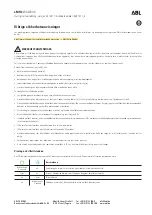
2.7 Before working with a lead acid battery, remove personal metal items
such as rings, bracelets, necklaces, watches, etc. A lead acid battery can
produce a short circuit current high enough to weld such items, causing a
severe burn.
2.8
CAUTION: TO REDUCE THE RISK OF INjURY, CHARGE ONLY
RECHARGEABLE LEAD ACID TYPE BATTERIES WHICH MAY
INCLUDE MAINTENANCE FREE, LOW MAINTENANCE, OR DEEP
CYCLE BATTERIES. OTHER TYPES OF BATTERIES MAY BURST
CAUSING PERSONAL INjURY AND DAMAGE.
The charger is not intended to supply power to a low-voltage electrical
system other than applications using rechargeable, lead-acid type
batteries. Do not use the battery charger to charge dry-cell batteries used
with home appliances. These batteries may burst and cause personal
injury or property damage.
2.9
NEVER
charge a frozen battery. Thaw it out first. Charging will then be
safer and more efficient.
3.
PREPARING TO CHARGE BATTERY
3.1 If necessary to remove the battery from the vehicle to charge, always
remove the grounded terminal from battery first. Make sure all accessories
in the vehicle are off to prevent a possible arc.
3.2 Be sure the area around the battery is well ventilated while the battery
is being charged. Gas can be forcefully blown away by using a piece of
cardboard or other nonmetallic material as a fan.
3.3 Clean the battery terminals. Be careful to keep corrosion from coming into
contact with your eyes.
3.4 Add distilled water in each cell until the battery electrolyte reaches the
level specified by manufacturer. This helps purge excessive gas from
cells. Do not overfill. For a battery without caps, carefully follow the
manufacturer’s recharging instructions.
3.5 Study all battery manufacturer’s specific precautions, such as removing or
not removing cell caps while charging, and recommended rates of charge.
3.6 Determine voltage of the battery by referring to the vehicle owner’s
manual, and make sure that the output voltage selector switch is set at the
correct voltage. If the charger has an adjustable charge rate, charge the
battery initially at lowest rate. If the charger has only one voltage, verify
that the battery voltage matches the voltage of charger. For a charger
not having an output voltage selector switch, determine the voltage of
the battery by referring to the vehicle owner’s manual and make sure it
matches the output rating of the battery charger.
•
3
•






































